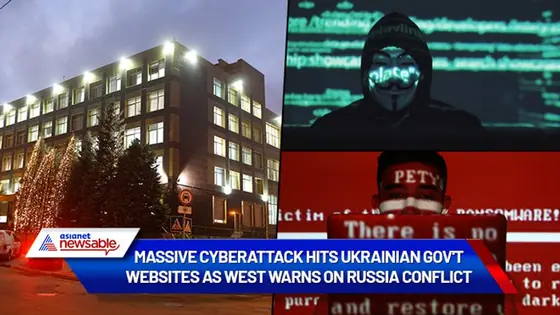
'Be afraid and expect the worse': Ukraine government websites hit by massive cyber-attack
The foreign ministry and the security and defence council were among those hit by the attack, along with embassies in the UK, US and Sweden.
A massive cyber-attack warning Ukrainians to 'be afraid and expect the worst' hit more than a dozen Ukrainian websites late on Thursday, prompting Kyiv to open an investigation. The foreign ministry and the security and defence council were among those hit by the attack, along with embassies in the UK, US and Sweden.

It remains unclear as to who was behind the cyber-attack, but a foreign ministry spokesperson said Moscow had been behind similar strikes in the past. Moscow has, however, not commented yet. This attack comes as Kyiv and its allies sound the alarm about a possible Russian military offensive against Ukraine, with reports suggesting a build-up of about 100,000 Russian troops near its borders.
Also read: Explained: Why Russia may not annex Ukraine's Donbas region
A message appeared on the hacked websites at the start of the cyber strike, which was posted in Ukrainian, Russian and Polish. The message read: Ukrainian! All your personal data was uploaded to the public network. All data on the computer is destroyed; it is impossible to restore it.
It continued: All information about you has become public, be afraid and expect the worst. This is for your past, present and future.
Among the sites targeted in the cyber-attack was the Diia website, a key system containing government services that stores personal vaccination data and certificates.
Following this cyber-attack, the SBU in Kyiv said that no personal data had been leaked, and no content had been changed. A number of other government websites have been suspended to prevent the attack from spreading, it said.
Meanwhile, Joseph Borrell, European Union's foreign policy chief, said that it had mobilised all its resources to aid Ukraine to deal with 'this type of cyber-attack'.
Since 2014, Ukraine has suffered a series of cyber-attacks, which have resulted in power failures, frozen supermarket tills, and the crashing of banks' IT systems. In 2017, a virus called NotPetya hit Ukraine and the rest of the world, paralysing thousands of machines. Russia denied any involvement, rejecting "unfounded blanket accusations".
Relations between Ukraine and Russia collapsed after Moscow's annexation of Crimea in 2014. Later that year, an outbreak of war between Kyiv's forces and Russian-backed separatists took place in eastern Ukraine.